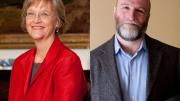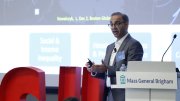In the wake of Faculty of Arts and Sciences (FAS) dean Michael D. Smith’s February 1 statement on the Administrative Board investigation of widespread misconduct on a final exam last spring, both President Drew Faust and Jay M. Harris, dean of undergraduate education, addressed the subject at the February 5 faculty meeting.
President Faust’s Perspective
Faust began by acknowledging interest in “a topic… which has been very much in the air for several months: our ongoing efforts to promote and ensure academic integrity.” She acknowledged and expressed appreciation for Smith’s e-mail and for his “efforts to generate community-wide conversation and reflection,” and encouraged his invitation “to do what an academic community does so well: raise questions, examine practices, interrogate assumptions, and seek new insights.” Among the pertinent questions in this instance, she later said, were:
How do we sustain the most constructive culture possible for learning? How do we help students realize the benefits of collaboration while also recognizing its appropriate limits? How do we create a climate that sets the highest expectations for our students, and at the same time affirms the norms we see as integral to the learning process? How do we help our students reconcile and balance the opportunities and demands they experience inside and outside the classroom? How do we—we who have devoted our lives to scholarship and teaching—how do we affirm and transmit the value—and the excitement—of learning for its own sake to our students in a world that increasingly urges them to think of their education in instrumental terms, urges them to focus on narrowly defined achievements and material outcomes?
She noted that Harris had been working with a committee focused on academic integrity for the past few years (its agenda and inquiries are described here, from his presentation last October), and looked forward both to his summary of its preliminary findings and to discussion of and action on its recommendations , as “we all… work together to affirm the values of diligence, high aspiration, mutual concern, and personal integrity that are the foundation of what we as an academic community exist to do and to be.”
The Committee on Academic Integrity: Dean Harris’s Summary of Preliminary Findings
Updating his October presentation on the Committee on Academic Integrity’s (CAI) “student-facing” and “faculty-facing” subcommittees, Harris said he expected to present formal recommendations—presumably for FAS consideration, and also for student-oriented programs and discussions in the Houses and elsewhere—in March.
The committee, he reminded FAS colleagues, was established two and a half years ago, in light of concerns that—in a changing culture that includes rapidly evolving technological access to information—student attitudes toward intellectual property and collaboration had become disconnected from faculty expectations. Although a survey on these issues elicited a disappointing volume of responses from students, he said, it did reveal a gap between professors and students in thinking about these issues.
The CAI surveyed the literature and examined other schools’ practices, and aimed to shift attitudes and institutional practices at Harvard from policing student behavior and “surveillance,” as he termed it, to an environment of trust and community among teachers and students. More broadly, in an era when students may seem overly focused on “grades and brownie points,” Harris hoped it would be possible to help “reset” the relationship with students so that they would jointly focus with their teachers—as a shared community—on deep learning and academic achievement.
• Student-focused recommendations. To that end, the committee would bring forth recommendations for “components of an honor code.” Such codes, he noted, are “a genus, not a species.” The core elements are students’ roles in developing and enforcing community norms—including participation in administering them (not a part of the Administrative Board’s processes now). That might include opportunities for students to express themselves, at foundational parts of their College career, in essays on the importance and meaning of academic integrity, and other measures to inculcate the sense that everything about their Harvard experience begins with integrity.
Harris was careful to note that honor-code provisions requiring students to report on violations of community standards “don't work” and accordingly will not be recommended. Honor-code institutions still have problems with cheating. Even a modified honor code will not be a “panacea,” and will not eliminate the need for some enforcement mechanism for ensuring that community standards are met. But, he continued, there is evidence that well-instituted honor codes do result in less cheating and in better student engagement with community standards and with learning.
Beyond these formal proposals—and Harris acknowledged undergraduates’ contribution in formulating them—he expected to advance new forms of “cultural interventions” to educate students about academic integrity, before they enroll, during the new freshmen’s opening days, and in House-based discussions. All would aim to “educate students into our expectations.” (See further elaboration below.)
• Faculty-focused recommendations. Harris said that in the digital culture, it had become unclear where the proper lines of behavior were drawn. No one, he said, would condone stealing a CD from a store; but many people had downloaded music casually from the Internet. It was important in this environment to clarify faculty behavior as a model for students and maximize student engagement with proper norms.
The committee was examining a “taxonomy of assessments”—the proper use of in-class versus take-home exams. (The spring 2012 final examination that resulted in the Ad Board’s investigation of improper collaboration was a take-home on which students had more than a week to work.) It was also looking at ways to share well-crafted exams, and to clarify “grading rubrics”: providing more transparent expectations about assignments so students would understand clearly what was expected and how their work would be evaluated.
Faculty members might not know what resources contemporary students have at hand, Harris said. For example, there are websites that collect problem sets and examinations, so professors might not know that students have access to such materials from prior years. So informed, faculty members might refresh their assignments so current assessments of students’ work can be conducted appropriately.
Similarly, faculty members need to work more closely with their graduate-student teaching fellows, and teaching assistants hired from outside Harvard, so these front-line instructors are clear and consistent in their interactions with students, their role in communicating standards of academic integrity, and grading. (The CAI’s membership includes graduate students, he noted later.)
In conjunction with the directors of undergraduate studies in each department, the CAI is also exploring including in the contents of the sophomore tutorial (or at other appropriate points in the concentration curriculum) training in the special norms for research integrity, citations, etc., within each discipline.
• Preparing for FAS action. As the committee refines its recommendations during the next few months, Harris said, it and the FAS administration would meet with department chairs, directors of undergraduate studies, and others to solicit their ideas. “This is not a Harvard issue” exclusively, Harris said. Academic integrity is a “national and international” concern.








